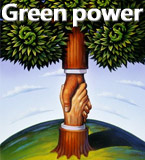Environmental investing comes of age
 Vancouver, Canada (By Deirdre McMurdy) - There was a time, not so very long ago, when ethical investing was the exclusive realm of sock-and-sandal-tree-hugging vegans. It was all about staking out the moral high ground and making a point that, while you may have disposable cash, you weren’t about to fork it over to the immoral Capitalist Throng.
Vancouver, Canada (By Deirdre McMurdy) - There was a time, not so very long ago, when ethical investing was the exclusive realm of sock-and-sandal-tree-hugging vegans. It was all about staking out the moral high ground and making a point that, while you may have disposable cash, you weren’t about to fork it over to the immoral Capitalist Throng.But as it is with so many other things that begin as niche markets, socially-responsible investment has gone mainstream. Big Time.
Anyone who doubts the urgency of such issues as environmental awareness, only has to track the media attention that’s been lavished on the new Harper Government’s plan – or lack of plan – for the Kyoto Accord.
And there’s no question that companies like Nike and Wal-Mart have felt considerable heat for business practices that are deemed to fall short of tougher investor expectations.
The thing is, in volatile global markets that are already fraught with so many unpredictable variables in the mix, anything that reduces the number of potential surprises for investors automatically gets bonus points.
And recent legal settlements prove that the price of not complying with new standards can be steep.
Michael Jantzi, who created the Jantzi Research to develop and track an index of “socially responsible” public companies, has had a front-row seat for the emergence of this phenomenon. He admits that when he started his business as a tiny venture in the late 1990s, he had no idea how quickly he’d be competing against the likes of Goldman Sachs and Merrill Lynch to provide clients with information about the ethical content of business plans. And the impact of that content on the bottom line.
Increasingly, companies that don’t keep a close eye on the sustainability of their initiatives – whether it’s the environment, human rights or corporate governance – often find their share price suffers. That’s not because of shareholders’ moral judgment against them, but because these days, the smart money is also responsible to an unprecedented roster of “stakeholders.”
In part, this movement has been fuelled by new disclosure requirements, which compel publicly-traded companies to alert investors to an unprecedented analysis of potential, future liabilities.
New corporate governance standards reinforce that by holding directors and other corporate officers personally liable in the event that such details aren’t disclosed.
Insurance companies, also concerned about liability, have become much more aggressive about scrutinizing the “ethical” content of those to whom they offer coverage. Again, they don’t want to be on the hook for class action suits and the related legal actions that have become commonplace.
And pension funds, aware that they represent the interests of a broad-based community, have had a huge impact in capital markets, by throwing trillions of dollars behind their decision to back good corporate citizens.
By way of example, as far back as 2001, the third largest pension fund in Britain – the Universities Superannuation Scheme – commissioned a report entitled “Climate Change: A Risk-Management Challenge for Institutional Investors.” The momentum behind these issues has grown rapidly since then.
That culminated recently when the United Nations released a set of global standards on socially-responsible investing, to help build awareness and to benchmark the progress of sustainable, responsible practices.
For individuals who want to put their money where their values are, there are a growing number of pre-packaged options. Canada’s credit union movement, for example, has offered ethical mutual funds since 1986.
Information about specific Canadian money managers and brokers who offer ethical funds or a socially-responsible template for portfolio design are available through such bodies as the Social Investment Organization.
(www.socialinvestment.ca).
For those who want to do their own research, there are specific publications, such as Environmental Finance, a U.K.-based online new service (www.environmental-finance.com) that offers international news on related business trends and corporate developments.
EthicScan is a fee-for-service consultancy that tracks the social, labor and environmental performance of 1,500 Canadian companies and benchmarks their results.
Meanwhile, Jantzi Research (www.jantziresearch.com), which has developed a Canadian Social Investment Database, offers research and comparative analysis of companies. It also has developed the Jantzi Social Index, a market capitalization-weighted common stock index of 60 companies that cut it in terms of a set of broadly-based social and environmental screens.
Information is also available through church, environmental, human rights and other groups with a declared interest in influencing the corporate agenda.
There’s also plenty of other material online, and the library is expanding swiftly.
Green after all, is also the color of money.
You can return to the main Market News page, or press the Back button on your browser.

